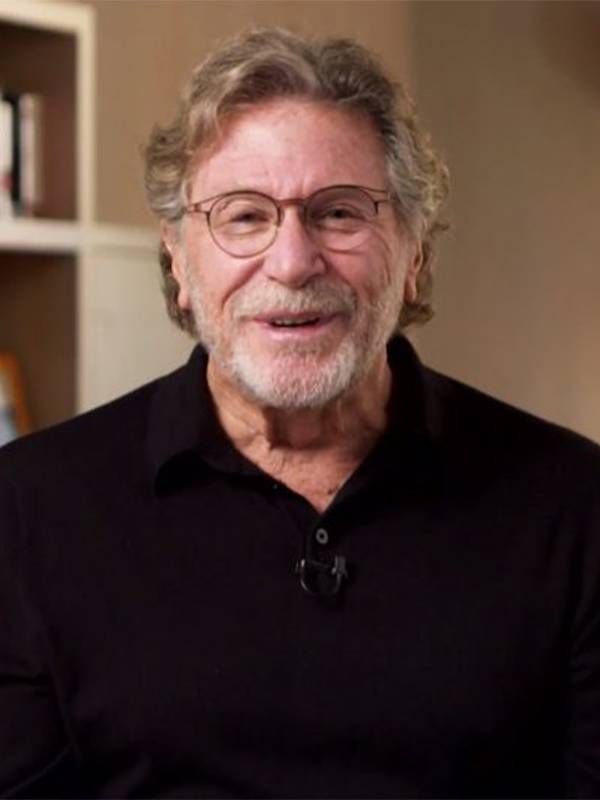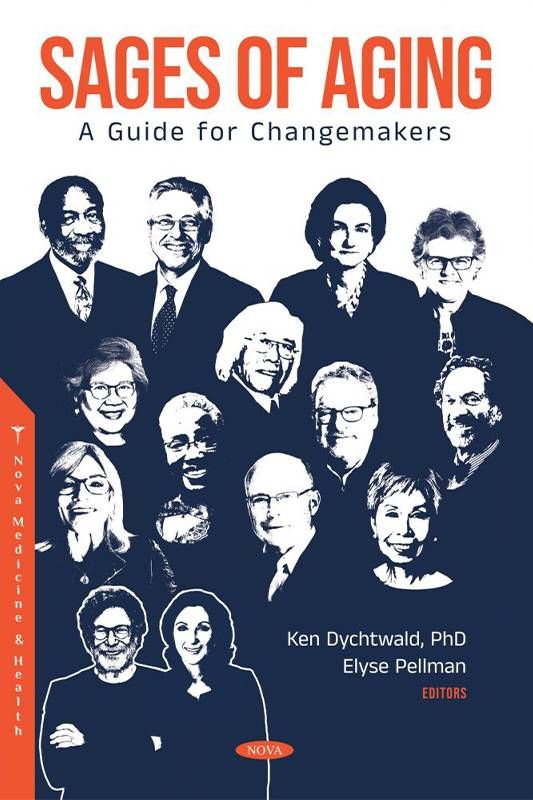What We Can Learn from the ‘Sages of Aging’
Age Wave CEO Ken Dychtwald interviewed 12 pioneers in the field of aging and talks about their legacy lessons for all of us
While working on his memoir "Radical Curiosity" a few years ago, Ken Dychtwald, the founder and CEO of Age Wave research and consulting firm, had an idea. What if he could film interviews with a dozen pioneers in the field of aging to share their wisdom, insights and legacy lessons about growing older?
So, in partnership with the American Society on Aging, Dychtwald set out to do just that.

The interviews first came out as a 12-part podcast series, which you can watch or listen to on the American Society on Aging's site or read excerpts in that site's "Generations Now" area. The interviews will be shown on over 200 PBS stations this fall.
Inside the 'Sages of Aging' Book
Dychtwald and Age Wave President Elyse Pellman have now compiled the interviews in a book, "Sages of Aging." It is a kind of "Tuesdays with Morrie" times 12. Mitch Albom's bestselling "Morrie" dispensed wisdom he had received over time from a former college professor.
"I felt that I was at the feet of the masters."
The 12 Sages in Dychtwald's and Pellman's book are all in their 60s, 70s and 80s; nine are Next Avenue Influencers in Aging. They include three former U.S. Assistant Secretaries for Aging: Fernando Torres-Gil, Kathy Greenlee and Jeanette Takamura; Encore.org Co-CEO Marc Freedman; Columbia University's Mailman School of Public Health Dean, Linda Fried; Mary's House for Older Adults founder Imani Woody; International Association of Gerontology and Geriatrics President Dr. John "Jack" Rowe and Larry Curley, executive director of the National Indian Council on Aging.
I recently interviewed Dychtwald about what these Sages told him. He said that when he was interviewing them, "I felt that I was at the feet of the masters."
After reading the book, I wished I had conducted similar "legacy" interviews with my parents before they died. Dychtwald hopes the book's readers — if they can — will have such conversations with their parents, filming the interviews for posterity and using the list of questions he has created for that purpose.
Following are highlights of my conversation with Dychtwald about what he took away from the "Sages" interviews:
Next Avenue: What made you want to undertake this project?
Ken Dychtwald: I'd been thinking there are some spectacular pioneers in the field alive today, who've been going at it for 30, 40, 50, 60 years. I wanted to interview people who were the founders of this modern field, and I wanted a diversity of perspective, gender, sexuality and skills.
The idea was to capture their views and perspectives: What worked? What didn't? What advice would you give to the future of this field? And who are you as a person?
So, every Wednesday my assistant Robin would come over and we'd set up my cameras and I'd have my mind blown.
Hard Work, but Little to Show for It
I've done these kind of "legacy experiences" with my mom and dad. And I also filmed my grandmother when I was 27. My grandmother was very much a peasant woman. She'd grown up an orphan, never had any money, she never wore makeup. And I showed up with my little reel-to-reel video camera and she had her lipstick on, and her hair was all combed. And I said: "Grandma, you sure look fancy." She said: "Well, you're making a movie of my life." And she really showed up.

These 12 people — they showed up.
Did you hear a theme from the Sages about the state of aging and aging in America today?
Well, it was the light and the dark. On the one hand, they felt very proud of the work that so many people were trying so hard to do to help older adults live with comfort and health and dignity and connection and purpose.
But they had largely felt that their work had been ineffective overall. There was the general sense that they hadn't been nearly as effective at creating change, at battling ageism, at sparking interest and attention in their field that thought they'd be.
I would also tell you they were, to my surprise, quite critical of the very field that they had created. For example, everyone thought that organizing a field around aging was a mistake.
Why?
First of all, they thought the word "aging" was the wrong word. They felt it brought a certain set of baggage with it. They like the word "longevity;" longevity was more hopeful.
And they felt that organizing people into groupings was a mistake. You know, "You're 65, you're now a senior." None of them wanted to be called "senior." They didn't like any of the language that they partly had a hand in shaping.
Marc Freedman talked about how we had created "age apartheid" by creating retirement communities.
"What you've got is a spaghetti ball of programs that are impossible to understand."
Fernando Torres-Gil, who is responsible for creating a lot of our aging and ability disability policies, felt that they had been done all wrong. That what you've got is — in his words — special interest groups dealing with loneliness or with brain health or with food.
And so, they build an organization and get policies to support it. And what you've got is a spaghetti ball of programs that are impossible to understand. Fernando said, living in LA, even he can't figure out what programs would be useful to him.
Improving Spiritually and Emotionally
One of my favorite questions in the book was: "Do you think of your own personal aging as an ascent or is it a descent?"
What I heard pretty consistently was that physically, they were trying to manage the descent. That it was clearly getting harder. "I can't run anymore, so I walk." "I have pain 24 hours a day; I have to deal with it." "I used to kayak; now, my kayak's sitting in the garage."
So, physically, it's not as though they've dropped off the edge of the shelf, but it's a descent they're attempting to hold at bay as best as possible.
Spiritually and emotionally? Every one of them: Straight up ascent. They feel more caring, more kind, more committed, more enriched, wiser.
What struck me was when I was listening to them is that one of their greater greatest assets was an incredible clarity of mind.
How Ageism Looks Today
What did you hear from the Sages about ageism?
Kathy Greenlee said the worst kind of ageism is when you don't ask something of somebody.
We've got a billion people in the world over the age of 60 and we haven't tasked them with anything. We think we've given them a break by saying: "You're done. You're free. Have fun. Enjoy yourself."

But what was pointed out to me was that by giving these folks nothing meaningful to be involved with, it's a type of ageism that maybe is even more pernicious than the bad portrayals of older people in commercials.
Kathy pointed out that some people in the aging field take the opinion that older people are disenfranchised, they're vulnerable and "I must protect them." And what we miss out on is: First, that doesn't empower older people.
Second, there's a lot of older people who are not vulnerable or fragile. Their vision may not be as good as it used to be or they can't run a mile as quick as they might have tried once, but they're still extraordinary individuals.
And by viewing them all as a wounded needy group, you may be contributing to the problem rather than fixing it.
Provide Opportunities to Do More
Kathy Greenlee also said we need to ask older people to do more and provide opportunities for them to do it. I wonder if you could talk a little bit about that.
I said to the Sages: "For the last decade, the average retiree in America watches 47 hours of television a week and only 24 percent of retirees volunteer. Are you OK with that?"
"By viewing them all as a wounded needy group, you may be contributing to the problem rather than fixing it."
Everyone said: "It is not OK."
Fernando talked about maybe we need a Service Corps.
There was generally the feeling among the Sages that having created a world in which so many older adults live without social purpose is not a good thing.
And older adults would benefit by being more contributory; it would put them in the flow of things. It would turn them onto modern technology. It would get them meeting new people making new friends. It would take them out of isolation and give them a chance to share their wisdom.
Teach People How to Age?
Were there any policy recommendations from the Sages that you thought were really interesting or really important to turn into reality?
Jack Rowe felt that aging ought to be taught. We have laws and states that require sex education in high school. He was suggesting that we have age education … How do you contemplate the idea that you might have a hundred-year life? How do you contemplate the financial and health and social unfoldings that are in front of you?
The earlier we can start the better.
Did the Sages see themselves as retired or did they want to retire?
I said to them: Do you think of yourself as retired? "Nope." You want to be retired? "Nope. I'd like to work less. I don't want the pressure. I want a little more freedom." They were still very much in the game.
They didn't feel that full retirement was productive, or useful or the right thing for people to be doing in the later years.


